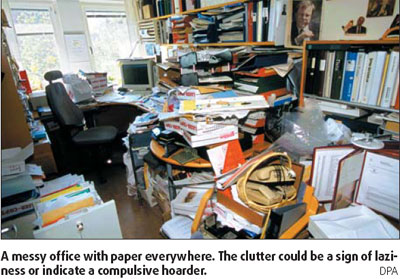Why clutter bugs find it so very hard to let go ... of anything
VIENNA: In their apartments, knick-knacks cover every flat surface, old newspapers, piled up to the roof, make living in the normal sense of the word impossible. But for some, this is the only way to exist. Sufferers from so-called "messy-house syndrome" (also known as Diogenes syndrome) can take hoarding and cluttering to new dimensions.
Hoarders are persons where messiness becomes the centre of their lives, explained Alfred Pritz, head of Vienna's Sigmund Freud private university, an expert on hoarding.
"The main problem is that Messies, as we call them in German, are unable to discard anything," Pritz says.
But when is a person just plain lazy and when a compulsive hoarder? "It is a slippery slope," Pritz says, from a little messy to the stage were it was impossible to get access to a house or apartment because of the clutter.

Hoarders may collect anything, from knick-knacks to guitars, but researchers discovered a great affinity for paper, so old newspapers top the list. The hoarded possessions are perceived as useless or of little value by non-Messies.
Sufferers from this obsessive-compulsive disorder hail from all age groups, with women as likely to be hoarders as men. According to estimates by Austrian experts, around 0.4 percent of the population hoard.
The number of unreported cases may however be significantly higher, as hoarders are trapped in a vicious circle. "People are ashamed. They don't want to let others see their apartments, and by and by lose all social contacts," Pritz says.
Researchers have been aware of the messy-house syndrome for the past 15 years, but outside the United States little extensive studies had been conducted. Sub-aspects like so-called "virtual messies" or "animal hoarders" are even less researched.
Virtual hoarders are unable to delete their emails or text messages, until their accounts are full and they are unable to send or receive messages. Animal hoarders sometimes make the news when authorities discover dozens of neglected pets crammed into run-down farms or apartments.
The situation was particularly difficult for partners or children of hoarders. Therapy for hoarders can start with a simple offer to help tidying up. Self-help groups and psychotherapy are other options.
Most important was the recognition that an illness existed, as many hoarders and clutterers felt happy and at home in their domestic chaos, Robert Gruber from an Austrian "Messie" self-help group said.
"Therapy is not very effective, unfortunately. Collecting things gives satisfaction. Amassing possessions can be an addiction, so it can happen that when the hoarder and his helpers clean up, he will start afresh," Pritz says.
DPA
(China Daily 12/04/2007 page19)














